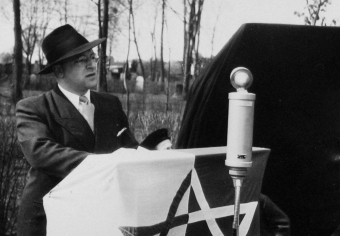Norbert Wollheim

© United States Holocaust Memorial Museum (Wollheim papers)
Norbert Wollheim (1913–1998) grew up in Berlin in an assimilated Jewish family. Deeply influenced by the Jewish youth movement of the 1920s and 1930s, he was active in community work throughout his life. In 1938/39 he played a pivotal role in organizing the Kindertransporte, the transports of refugee children to England. In March 1943, Norbert Wollheim, along with his wife Rosa and their 3-year-old son, Uriel, were deported to Auschwitz, where he was sent to the Buna/Monowitz concentration camp for forced labor. His wife and child were murdered right after arrival.
After liberation, Norbert Wollheim lived in Lübeck, in the British Zone of Occupation, and became an advocate for the Jewish Displaced Persons (DPs) there. He testified in several postwar trials and eventually, in the 1950s, filed suit against I.G. Farben, seeking compensation for lost wages and damages suffered. This lawsuit led to the first payment of compensation to former Nazi-era forced laborers by a German company. In 1951 Norbert Wollheim, with his second family, emigrated to the United States, where in later years he spoke about his life story in interviews.
















